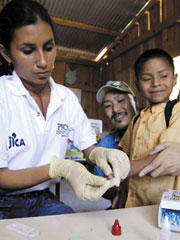- Home
- About JICA
- President's Desk
- Former President's Visits & Remarks
- OGATA Sadako
- JICA at a "Historical Turning Point"
OGATA Sadako
December 1, 2006
JICA at a "Historical Turning Point"

In an increasingly complex and globalized world, Japan's foreign assistance to poor countries is more important than ever, Mrs. Sadako Ogata, President of the Japan International Cooperation Agency (JICA) said Friday (December 1).
Ogata addressed the Foreign Correspondents Club in Tokyo on the implications of the current restructuring of Japan's Official Development Assistance (ODA) and JICA itself.
When it is completed in 2008, "New JICA" will become one of the largest bilateral development organizations in the world with a network of 97 overseas offices, projects in more than 150 countries, and available financial resources of approximately 1 trillion yen ($8.5 billion).
Ogata called it a "historical turning point" in the history of JICA and Japan's ODA.
"Our world is increasingly interlinked," Ogata told the meeting. "Borders are no longer barriers to transnational crime, terrorism, or even diseases such as SARS. In such an environment, ODA is more important than ever. Assisting developing and poor countries are requirements for building a prosperous global community."
A major component of the comprehensive overhaul of ODA will be the merger between JICA and that part of the Japan Bank for International Cooperation (JBIC) which currently extends yen loans to developing countries.
The reorganized agency will also administer part of Japan's grant aid which is currently under the jurisdiction of the Ministry of Foreign Affairs.
In the future all three major ODA components--technical cooperation, grant aid, and yen loans--will be managed "under one roof" Ogata said, making operations more streamlined, effective, and faster.
"More comprehensive planning will be possible through simplified and quick decision making," she said. "This, in turn, will result in a more integrated and efficient foreign assistance program that can better address the needs of developing nations."
The president said New JICA will also strengthen research and training capacity in the years ahead, acting as a kind of ODA think tank, contributing to global development strategies, strengthening collaboration with international institutions, and being better able to communicate Japan's position on major development and aid issues.
The forthcoming changes will be an extension of a series of JICA reforms which began three years ago when it became administratively independent. The organization's domestic infrastructure and international centers where JICA helps train some 8,000 foreign officials annually are being streamlined. More staff have been moved to overseas offices, giving them more autonomy and flexibility, reducing bureaucracy, and fast tracking projects.
An increasing number of JICA projects include what Mrs. Ogata described as providing "human security." Effectively these grass-roots projects--providing teachers and schools or water wells and health clinics--help to empower local communities, giving them a greater stake in planning their own future.
- About JICA
- News & Features
- Countries & Regions
- Our Work
- Thematic Issues
- Types of Assistance
- Partnerships with Other Development Partners
- Climate Change / Environmental and Social Considerations
- Evaluations
- Compliance and Anti-corruption
- Science and Technology Cooperation on Global Issues
- Research
- JICA Development Studies Program / JICA Chair
- Support for the Acceptance of Foreign HRs / Multicultural and Inclusive Community
- Publications
- Investor Relations
